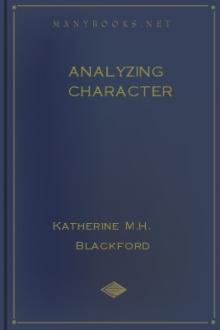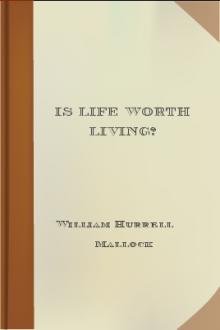Analyzing Character, Arthur Newcomb [popular romance novels .txt] 📗

- Author: Arthur Newcomb
- Performer: -
Book online «Analyzing Character, Arthur Newcomb [popular romance novels .txt] 📗». Author Arthur Newcomb
INDUSTRY
The fourth element is disposition to industry. Some wag once said: "All men are lazy, but some are lazier than others." It might sound better to say that all men are industrious, but some men are more industrious than others. There is such a quality of body and mind as the quality of predisposition to action and industry. Industry is very largely dependent upon energy. Energy depends upon oxygen. If one sits in a room that is stuffy and not well ventilated, one soon becomes stupid, sleepy, and not particularly acute mentally. In other words, he is partly starved for oxygen. Now, let him go out into the open air and breathe plenty of oxygen into his lungs. In a little while he raises his chest and brings up the crown of his head and takes the positive physical attitude. He is more energetic. He is eager for activity—for work. Some people are naturally deficient in depth, activity, and quality of lung power. They do not breathe in or use much oxygen, so they are lacking in energy. Such people are not predisposed to industry. Love of work—love of the game that causes a man to be interested in every phase of his work—is not, however, wholly dependent upon energy. It is something in the very heart and fiber of the man. Willingness to work, perseverance in work, and decision come under disposition to industry.
NATURAL APTITUDE
The fifth criterion is natural aptitude. Everyone has observed that some people are naturally commercial. We have seen a boy take a penny to school, buy a slate pencil or a lead pencil with that penny, and trade that for an old pocket knife, the knife for something else, and keep on swapping until he had a gun, a set of chess, a bag of marbles, and several other important boys' acquisitions, all from that one penny. Another boy takes penny after penny to school and he never has anything to show for it You know such boys—and grown people, too. Every individual has some such aptitudes—either latent or developed, either mediocre or marked—and his aptitudes fit him better for some one vocation than for any other.
EXPERIENCE
The sixth point to be considered is experience. One might be fitted for a vocation with all of the five points that we have enumerated, and yet not have either the education or the training for it. What shall he do? Theoretically and ideally, every individual should be carefully and thoroughly trained, from his earliest childhood, for the vocation for which he is physically, mentally, and morally fitted. But this seldom happens—and can happen but seldom so long as parents and teachers remain ignorant of human nature and of work. A hard problem, then, confronts the young man or young woman past school days and not trained for the right calling. He or she must decide whether to compromise upon work as nearly right as possible or to make the necessary sacrifices to obtain education, training, and experience. There is much evidence in favor of choosing either horn of the dilemma. A most successful manufacturer called upon us recently. We told him that, with proper training, he would have been even more successful and far better satisfied in the legal profession. "I know you are right," he said. "I have always regretted that circumstances prevented my taking a law course as a young man. However, I have an extensive law library, do practically all the legal work for my firm, and am often consulted on obscure legal points relative to the manufacturing business by lawyers of some renown."
Abraham Lincoln, the farmhand and flatboatman, began the study of grammar at twenty-two and of law still later. Elihu Burritt, "The Learned Blacksmith," who lectured in both England and America, taught himself languages and sciences while working eleven hours a day at the forge.
We enjoy the acquaintance of a woman physician of considerable prominence who did not enter medical college until she was more than fifty years of age. Henry George was a printer who studied economics after he was twenty-seven years old. Frederick Douglass was a slave until he was twenty-one, yet secured a liberal education, so that he became a noted speaker and writer. The following from "Up from Slavery,"[3] by the late Booker T. Washington, shows what can be done by even a poor black boy, without money or influence, to win an education:
[3] Doubleday, Page & Company, Garden City, New York.
BOOKER T. WASHINGTON'S STORY
I determined when quite a small child that, if I accomplished nothing else in life, I would in some way get enough education to enable me to read common books and newspapers. Soon after we got settled in some manner in our new cabin in West Virginia, I induced my mother to get hold of a book for me. How or where she got it I do not know, but in some way she procured an old copy of 'Webster's Blue-back Spelling-book,' which contained the alphabet, followed by such meaningless words as 'ab,' 'ba,' 'ca,' and 'da.' I began at once to devour this book, and I think that it was the first one I ever had in my hands. I had learned from somebody that the way to begin to read was to learn the alphabet, so I tried in all the ways I could think of to learn it—all, of course, without a teacher, for I could find no one to teach me. At that time there was not a single member of my race anywhere near us who could read, and I was too timid to approach any of the white people. In some way, within a few weeks, I mastered the greater portion of the alphabet. In all my efforts to learn to read my mother shared fully my ambition and sympathized with me and aided me in every way that she could. Though she was totally ignorant so far as mere book knowledge was concerned, she had high ambitions for her children, and a large fund of good hard common sense, which seemed to enable her to meet and master every situation. If I have done anything in life worth attention, I feel sure that I inherited the disposition from my mother.
The opening of the school in the Kanawha Valley brought to me one of the keenest disappointments that I ever experienced. I had been working in a salt-furnace for several months, and my stepfather had discovered that I had a financial value, and so, when the school opened, he decided that he could not spare me from my work. This decision seemed to cloud my every ambition. The disappointment was made all the more severe by reason of the fact that my place of work was where I could see the happy children passing to and from school morning and afternoon. Despite this disappointment, however, I determined that I would learn something anyway. I applied myself with greater earnestness than ever to the mastering of what was in the blue-back speller.
My mother sympathized with me in my disappointment and sought to comfort me in all the ways she could and to help me find a way to learn. After a while I succeeded in making arrangements with the teacher to give me some lessons at night, after the day's work was done. These night lessons were so welcome that I think I learned more at night than the other children did during the day. My own experiences in the night-school gave me





Comments (0)